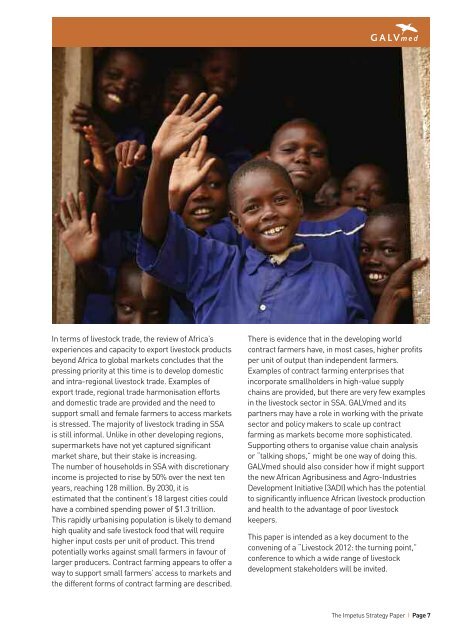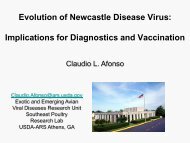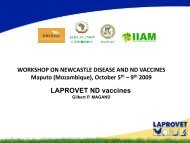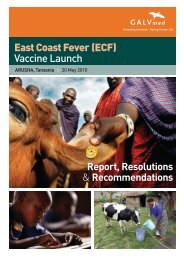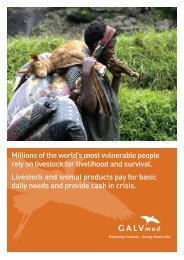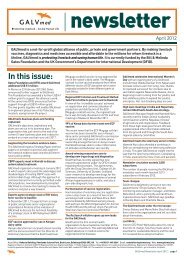A Path to Prosperity New Directions for African Livestock
GALVmed Impetus Strategy Paper
GALVmed Impetus Strategy Paper
- No tags were found...
Create successful ePaper yourself
Turn your PDF publications into a flip-book with our unique Google optimized e-Paper software.
In terms of lives<strong>to</strong>ck trade, the review of Africa’s<br />
experiences and capacity <strong>to</strong> export lives<strong>to</strong>ck products<br />
beyond Africa <strong>to</strong> global markets concludes that the<br />
pressing priority at this time is <strong>to</strong> develop domestic<br />
and intra-regional lives<strong>to</strong>ck trade. Examples of<br />
export trade, regional trade harmonisation ef<strong>for</strong>ts<br />
and domestic trade are provided and the need <strong>to</strong><br />
support small and female farmers <strong>to</strong> access markets<br />
is stressed. The majority of lives<strong>to</strong>ck trading in SSA<br />
is still in<strong>for</strong>mal. Unlike in other developing regions,<br />
supermarkets have not yet captured significant<br />
market share, but their stake is increasing.<br />
The number of households in SSA with discretionary<br />
income is projected <strong>to</strong> rise by 50% over the next ten<br />
years, reaching 128 million. By 2030, it is<br />
estimated that the continent’s 18 largest cities could<br />
have a combined spending power of $1.3 trillion.<br />
This rapidly urbanising population is likely <strong>to</strong> demand<br />
high quality and safe lives<strong>to</strong>ck food that will require<br />
higher input costs per unit of product. This trend<br />
potentially works against small farmers in favour of<br />
larger producers. Contract farming appears <strong>to</strong> offer a<br />
way <strong>to</strong> support small farmers’ access <strong>to</strong> markets and<br />
the different <strong>for</strong>ms of contract farming are described.<br />
There is evidence that in the developing world<br />
contract farmers have, in most cases, higher profits<br />
per unit of output than independent farmers.<br />
Examples of contract farming enterprises that<br />
incorporate smallholders in high-value supply<br />
chains are provided, but there are very few examples<br />
in the lives<strong>to</strong>ck sec<strong>to</strong>r in SSA. GALVmed and its<br />
partners may have a role in working with the private<br />
sec<strong>to</strong>r and policy makers <strong>to</strong> scale up contract<br />
farming as markets become more sophisticated.<br />
Supporting others <strong>to</strong> organise value chain analysis<br />
or “talking shops,” might be one way of doing this.<br />
GALVmed should also consider how if might support<br />
the new <strong>African</strong> Agribusiness and Agro-Industries<br />
Development Initiative (3ADI) which has the potential<br />
<strong>to</strong> significantly influence <strong>African</strong> lives<strong>to</strong>ck production<br />
and health <strong>to</strong> the advantage of poor lives<strong>to</strong>ck<br />
keepers.<br />
This paper is intended as a key document <strong>to</strong> the<br />
convening of a “Lives<strong>to</strong>ck 2012: the turning point,”<br />
conference <strong>to</strong> which a wide range of lives<strong>to</strong>ck<br />
development stakeholders will be invited.<br />
The Impetus Strategy Paper I Page 7


